Разработка сценария праздника,
посвященного Европейскому Дню языков.
Цели мероприятия:
20017 год
Сценарий проведения празднования « Европейского дня языков»
Выходят два ведущих учащиеся старших классов.
Ведущий 1: Good day dear friends!
Ведущий 2: Guten Tag!
Ведущий 1: Bon dia!
Bедущий 2: Добрый день!
Bедущий 2: As you’ve heard our greetings to you were done in four languages: English, German, Portugal and Russian. Do you know why?
Ведущий 1: Because on the 26 of September there is a holiday. The day of European languages. By the way, there is a very interesting legend of how different languages appear on the Earth. Here is what one of the legends says. ( ученики инсценируют легенду)
Рассказчик: Это было так давно, что никто уже и не помнит, когда это было. В те времена все люди говорили на одном языке и все друг друга понимали.
Захотелось людям оставить о себе память на веки веков.
Учащийся 1: Давайте соберемся все вместе и выстроим башню до самого неба!
Учащийся 2: Выберем самую высокую гору и за работу!
Учащийся 1: Мы замесим глину и будем лепить из нее кирпичи.
Учащийся 2: Мы обожжем эти кирпичи в печах и отвезем их на гору.
Учащийся 3: А мы построим из кирпичей такую башню, что ее вершина будет касаться облаков.
Рассказчик: Все работают, всем весело, все поют. (Любая дружная, веселая песня).
А вокруг горы, на которой строилась башня, вырос город Вавилон.
С каждым днем все выше и выше, уступами, поднималась красавица башня…
Но вдруг появляется среди людей сам бог Ягве. Не понравилась ему затея – выстроить башню до самого неба.
Бог Ягве: Это оттого они умудрились свою башню выстроить, что у них один язык, и всякий человек понимает другого. Вот они и договорились!
Рассказчик: И послал бог на землю великую бурю, и ветер унес слова, которые люди привыкли говорить друг другу.
Учащийся 1: Wir mussen die Arbeit enden, doch haben wir noch viel zu tun. Machen wir das Dach alle zusammen.
Учащийся 2: What do they speak about? The language is so strange…We can not work with them.
Учащийся 3: Уйдем отсюда и построим свой город. Надоело это столпотворение.
Рассказчик: И вместо одного народа получилось множество разных народов. И разошлись люди в разные концы Земли, каждый в свою сторону.
А башня стала мало-помалу разваливаться. И до сих пор на всех языках мира люди рассказывают эту сказку о недостроенной Вавилонской башне.
Ведущий 2: A very nice legend with a sad end. Let’s learn and improve different languages. Not Bavilone Towers appear on the world.
Ведущий 1: So all pupils in our grammar school learn foreign languages English and German.
Ведущий 2: And I’m sure it is great, because while learning English or German you find out many new interesting facts about culture of these countries. Learn the names of the famous writers and their works. You become more educated person.
Ведущий 1: You are quite right. Only when we started to learn English we got acquainted with the names of such famous poets as Robert Burns and William Shakespeare.
One pupil reads the poem of Robert Burns “My heart in the H ighlands”.
And on the words of the sonnet 90 by Shakespeare was written a nice music.
The pupil reads sonnet 90 by Shakespeare.
Ведущий 3: Jetzt lernen wir einiges aus der deutschen klassischen Literatur kennen.
Mit den Namen der Klassiker J. Goethe, F. Schiller, H. Heine ist eine ganze Epoche nicht nur in der deutschen Literatur, sondern auch in der Weltliteratur verbunden.
Hört zu! Ihr könnt einige schöne Gedichte kennenlernen.
Nun ein kleines Gedicht von H.Heine.
Der Brief, den du geschrieben,
Er macht mir gar nicht bang;
Du willst mich nicht mehr lieben,
Aber dein Brief ist lang.
Zwölf Seiten, eng und zierlich,
Ein kleines Manuskript!
Man schreibt nicht so ausführlich,
Wenn man den Abschied gibt.
Перевод А.Майкова
Меня ты не смутила,
Мой друг, своим письмом.
Грозишь со мной все кончить –
И пишешь целый том!
Так мелко и так много…
Читаю битый час…
Не пишут так пространно
Решительный отказ.
Viele bekannte russische Dichter übersetzten die Balladen von J.W. Goethe und F. Schiller.
Der Fischer.
Das Wasser rauscht, das Wasser schwoll
Ein Fischer saß daran,
Sah nach der Angel ruhevoll,
Kühl bis ans Herz heran.
Und wie er sitzt und wie er lauscht,
Teilt sich die Flucht empor;
Aus dem bewegten Wasser rauscht
Ein feuchtes Weib hervor.
Я.П. Полонский
Рыбак.
Волна бежит, шумит, колышет
Едва заметный поплавок.
Рыбак поник и жадно дышит
Прохладой, глядя на поток.
В нем сердце сладко замирает –
Он видит: женщина из вод,
Их рассекая, выплывает…
Ведущий 2: Oh, do you hear the magic sounds?
Ведущий 1: Of course, I know. It is Bakh, Iogan Sebastijan, the famous German composer. People all over the world enjoy his music.
Учащийся: Seine Orgelmusik begeistert mich besonders (На фоне музыки Баха).
Ведущий 2: And let’s make an excursion to the famous Art Galleries and Museums of England and Germany.
Учащийся: Besonders bekannt sind in Deutschland” die Dresdener Gemälde Galerie und die Münchener Pinakothek.
Слайды по музеям с комментариями.
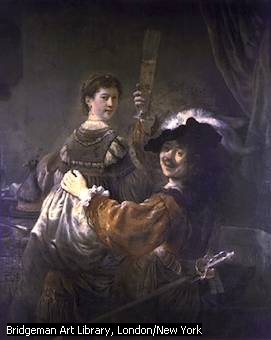
Rembrandt and Saskia
Dutch artist Rembrandt painted this double portrait of himself and his wife in 1635, about a year after his marriage to Saskia van Uylenburgh. This sensuous work shows the artist balancing Saskia on his knee with one hand and raising a glass of ale in an exuberant toast with the other. The painting is in the Gemäldegalerie in Dresden, Germany.
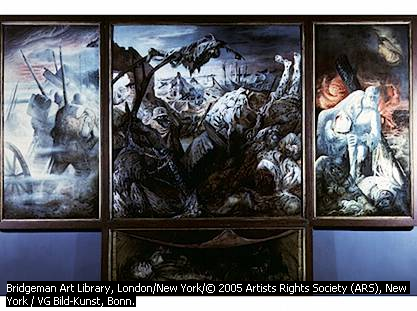
War by Otto Dix
This dark vision of the horrors of war by German artist Otto Dix reflects the artist's experience as a soldier in World War I (1914-1918). Dix led an artistic and literary movement called the Neue Sachlichkeit (“new objectivity”), whose members sought to present an often harsh view of reality. The triptych War (1929-1932) is in the Gemäldegalerie, in Dresden, Germany.
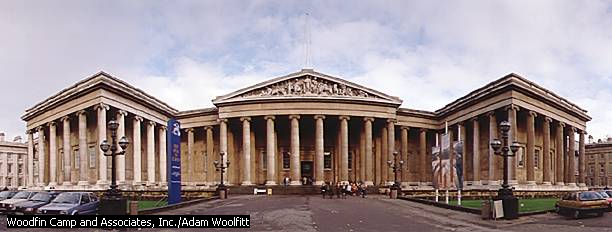
British Museum
T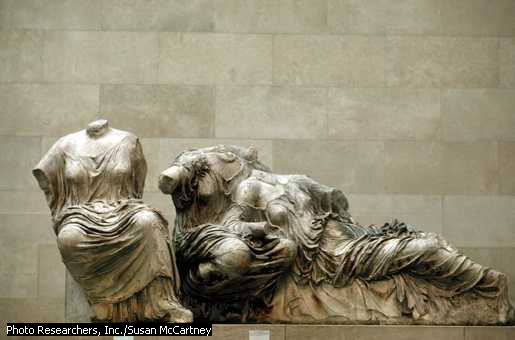 he British Museum in London, England, is the United Kingdom’s national museum of antiquities, containing more than 6 million objects. Founded in 1743, the museum has occupied the current building, shown here, since it was completed in 1847. The building was designed by English architect Sir Robert Smirke, a leader in the use of the Greek Revival style that incorporated elements of classical Greek architecture into early 19th- century buildings.
he British Museum in London, England, is the United Kingdom’s national museum of antiquities, containing more than 6 million objects. Founded in 1743, the museum has occupied the current building, shown here, since it was completed in 1847. The building was designed by English architect Sir Robert Smirke, a leader in the use of the Greek Revival style that incorporated elements of classical Greek architecture into early 19th- century buildings.
Elgin Marbles
The Elgin Marbles are a group of classical Greek sculptures that receive their name from British diplomat Thomas Bruce, seventh earl of Elgin. Elgin removed the sculptures from the Acropolis in Athens and brought them to London in the early 1800s. The marbles, most of which were sculpted in the 5th century bc by Phidias, now reside in the British Museum in London.
Ведущий 2: We should say that the knowledge of English and German will make your traveling really enjoyable because it’ll help you to feel yourself comfortable.
Ведущий 1: Let’s us see some moments where your foreign language is really necessary.
At the shop
Customer: Hello. Could you help me? I’m looking for a pair of jeans.
Shop assistant: Well, what size do you want?
Customer: I wear size 10 in clothes.
Shop assistant: What colour trouses would you like?
Customer: I’d prefer light blue.
Shop assistant: Here you are. The fitting room is at the back if you want to try them on.
Customer: Thank you.
Shop assistant: How do they fit?
Customer: Oh, it fits like a glove. How much are they?
Shop assistant: They are 30 pounds. How would you like to pay?
Customer: I’ll pay cash.
Shop assistant: Here’s your receipt and change. Thank you for shopping with us.
At the hotel
Clerk: Hello, what can I do for you?
Guest: Hello, I want a room for two weeks.
Clerk: Very well, would you please fill in this form?
Guest: Certainly.
Clerk: What’s your name?
Guest: My name is Alexey Zhukhov.
Clerk: Would you spell the last name please.
Guest: Z-h-u-k-h-o-v, Alexey Zhukhov.
Clerk: And where are you from?
Guest: I’m from Belgorod, Russia.
Clerk: Yes, Mr. Alexey Zhukhov, from Belgorod. Room 705. Here is your key. Go to the end of the hall and turn left. You’ll see the elevator. Take the elevator to the eighth floor and turn right. Room 705 will be on your left.
Guest: Thank you.
Clerk: Are those your suitcases?
Guest: Yes, they are.
Clerk: The bellboy will show you up to your room.
Guest: Thank you very much.
At the Customs
Customs Officer: Good afternoon, Madam. Can I see your Passport please?
Traveller: Yes, of course. Here you are.
Customs Officer: Is that suitcase yours?
Traveller: Yes, it is.
Customs Officer: Could you put your suitcase on the table?
Traveller: Certainly, here is the key.
Customs Officer: Can you open your suitcase for me?
Traveller: Yes, of course.
Customs Officer: Have you got anything to declare?
Traveller: No, nothing special.
Customs Officer: Let me see… That’s all right. Thank you very much, Madam. You can close your suitcase now. Good-bye.
Traveller: Good-bye.
Ведущий 1: And at last English is simply for pleasure.
Ведущий 2: Deutsch macht Spaβ! ( дети инсценируют сказки и играют в игры на английском и немецком языках)
STADTMUSIKANTEN
Handelnde Personen: HUND Packan;
ESEL Grauschimmel;
KATER Bartputzer;
HAHN Rotkopf
HUND (sitzt rechts): Wau! Wau!
ESEL (kommt): Hallo, Packan! Warum heulst du so?
HUND: Ja, soll ich denn nicht heulen! Ich bin alt und schwach. Ich kann nicht mehr mit meinem Herrn auf die Jagt gehen. Mein Herr wollte mich totschlagen. Aber ich lief fort. Was soll ich denn tun, Grauschimmel?
ESEL: Hör zu! Mir geht es auch nicht besser. Lange Jahre habe ich Säcke zur Mülle getragen. Ich bin auch alt und schwach geworden. Ich kann nicht mehr arbeiten. Und mein Herr gibt mir kein Futter mehr.
HUND: Was sollen wir jetzt tun?
ESEL: Weißt du was? Komm mit zur Musik! Ich gehe nach Bremen und werde dort Stadtmusikant. Ich spiele die Laute und du kannst die Trommel schlagen. (Sieht nach rechts.) Sieh, da kommt ein Kater.
KATER: Miau! Miau! Miau!
HUND zum Kater: Was ist mir dir los, Bartputzer? Warum bist du so traurig?
KATER: Wie kann ich lustig sein? Ich bin alt. Meine Augen sind schwach. Meine Zähne sind stumpf. Ich kann keine Mäuse mehr fangen. Die Frau wollte mich ersäufen, da lief ich fort. Was soll ich jetzt machen? Wohin soll ich gehen?
ESEL: Komm mit nach Bremen! Dort kannst du Stadtmusikant werden.
KATER: Danke, danke. Ich gehe gern mit euch nach Bremen.
HAHN (läuft vorbei und schreit): Ki-ki-ri-ki! Ki-ki-ri-ki! Ki-ki-ri-ki!
KATER: Warum schreist du denn so laut dein Ki-ki-ri-ki? Was ist denn los?
HAHN: Ich habe solche Angst! Morgen ist Sonntag. Und zu meiner Herrin kommen Gäste. Sie will mich in der Suppe kochen. Heute Abend schon soll mir die Köchin den Kopf abschneiden. Darum schreie ich so. Ich will noch nicht sterben.
ESEL: Komm mit, Rotkopf! Geh mit uns nach Bremen. Du hast eine schöne Stimme. Du kannst Stadtmusikant werden.
HAHN: Ki-ki-ri-ki! Ki-ki-ri-ki! Ki-ki-ri-ki! Ich gehe mit euch nach Bremen!
(Alle zusammen singen das Lied)
Wir ziehen in die große Stadt
Tschin-tschin-dra-ra-bum-bum,
Die Platz genug für alle hat
Tschin-tschin-dra-ra-bum-bum.
Vier Stadtmusikanten wollen wir werden
Tschin-tschin-dra-ra-bum-bum.
Dann gibt’s ein Obdach und Gewerbe
Und wir sind froh, froh, froh,
und wir sind so froh.
HUND: Wau - Wau – Wau!
KATER: Miau – Miau – Miau!
ESEL: I-a, I-a, I-a!
HAHN: Ki-ki-ri-ki! Ki-ki-ri-ki! Ki-ki-ri-ki!
Three little kittens
Characters: Author, mother cat, 1st kitten, 2d kitten, 3d kitten.
Scene
Author: The three little kittens
Lost their mittens
And they began to cry.
1st kitten: Oh, Mother dear,
2d kitten: We very much fear
3d kitten: That we have lost our mittens!
Cat: Lost your mittens
You naughty kittens!
Then you will have no pie. (the kittens go away)
Author: The three little kittens
Found their mittens
And they began to cry. (the kittens run in)
Three kittens (together): Oh, Mother dear,
1st kitten: See here,
2d kitten: See here
3d kitten: See, we have found our mittens.
Cat: Oh, you are good kittens!
Put on your mittens,
And you will have some pie. (gives them pies)
But I smell a mouse close by.
(all together): We smell a mouse close by.
Good-bye!
(The Cat and the kittens leave the stage)
English game. “Egg and spoon race”
Two teams of pupils. Children from each team try to carry a spoon with an egg up to the necessary point. (usually we use music)
Ведущий 2: English and German are necessary for having a chance to study abroad. To continue your education abroad is a dream but it is not an easy decision. What waits you there? Is it a success or disappointment? Nowadays international connections and scientific exchange are of great value. In this case there are different programmes suggesting you different courses of improving language. For example:
Educational programmes in England:
“English language holidays” (for the first time visitors of Britain)
“Language holidays premium” (classical British language for advanced people)
‘English De Luxe” (individual attitude to all children, rich cultural programme)
“A-levels – the way to the best universities” (almost all children are students of Great Britain after getting A-levels)
Ведущий3: Mächtet ihr in Deutschland eure Bildung bekommen oder vortsetzen, wendet ihr euch an die Botschaft von Deutschland. Das Goethe-Institut gibt auch solche Information. Danach könnt ihr auch im Internet suchen:
www.campus-germany.de
www.daad.de/deutschland/en/index.html/
www.goethe.de
www.studienkollegs.de
Ведущий 2: You can improve your language not only by different courses but also you have a great chance to communicate with foreigners in our town.
Our authorities pay much attention to the international cooperation. In different years partners contracts were made between such cities as: Cherne (Germany), Aldgine (Great Britain), Opole (Poland) Chan – Chun (China).
From 1990 we are together with Herne. We pay much attention to professional exchange. Teachers and children take an active part in the project “We in our cities”. The programme of doctors exchange is a great chance in developing knowledge in the sphere of medicine. We organize exchange between students and school children.
In February 2005 we celebrated 15th anniversary of partners relations between Belgorod and Herne. Mr. Horst Shirek and V.N. Potrasaev signed the agreement to continue our relations.
According to the agreement in October 2006 pupils and teachers of Belgorod schools №1, 2, 22 visited Herne, where during a week lived in the families, get acquainted with the culture of Germany.
We have much to do in future. And I think all of you will learn foreign languages with great interest and it will help you to be successful.





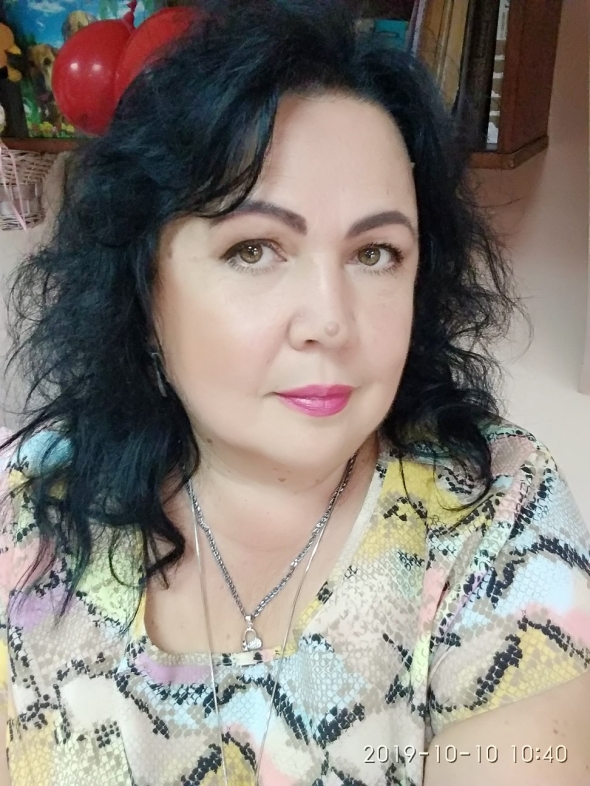




 he British Museum in London, England, is the United Kingdom’s national museum of antiquities, containing more than 6 million objects. Founded in 1743, the museum has occupied the current building, shown here, since it was completed in 1847. The building was designed by English architect Sir Robert Smirke, a leader in the use of the Greek Revival style that incorporated elements of classical Greek architecture into early 19th- century buildings.
he British Museum in London, England, is the United Kingdom’s national museum of antiquities, containing more than 6 million objects. Founded in 1743, the museum has occupied the current building, shown here, since it was completed in 1847. The building was designed by English architect Sir Robert Smirke, a leader in the use of the Greek Revival style that incorporated elements of classical Greek architecture into early 19th- century buildings.









